If you’ve been following me on the social media, you might have noticed that I’m on a crusade to get everyone in the world to watch NBC’s Hannibal. I haven’t wanted to turn people onto a show this badly since Community season 2. It’s that good – and incredibly overthinkable!
The first season is now available to stream for $0 on on Amazon Prime, and to convince you to watch it, I’ve written this MOSTLY SPOILER FREE! post about it. Okay, I did include a few very minor spoilers, most of which come from the first episode – and I’m assuming you already know Dr. Lecter’s big secret. Here’s a hint: It rhymes with “schmannibalism.”
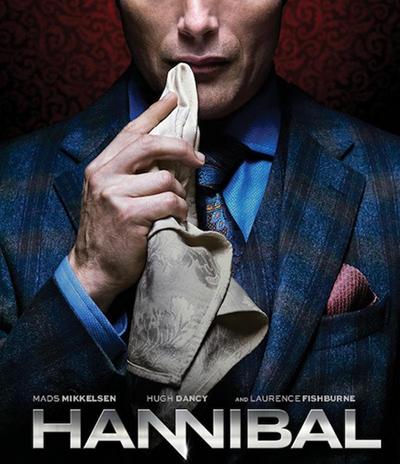
It is not from the benevolence of the butcher, the brewer, or the baker that we expect our dinner, but from their regard to their own interest.
—Adam Smith
Is there a figure in today’s pop culture landscape that personifies conspicuous consumption like Hannibal Lecter? The Kardashians, possibly, or any of the Real Housewives, but to my knowledge none of them eat human flesh or look as good in three-piece suits, so point Lecter.
In most respects, the not-so-good doctor represents the perfect specimen of the homo consumericus. I won’t belabor this point, ’cause it’s obvious. Hannibal lives in an unnecessarily large and immaculately furnished house in the middle of Baltimore, a.k.a. The Wire Central. He drives a Bentley. He wears a $180,000 watch. Let me repeat that last one. He wears a $180,000 watch.
Frequent readers of Overthinking It know I’m a chart nut, so let’s start a little chart, shall we? Bullet point #1: Hannibal Lecter = the platonic Consumer:
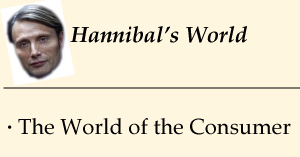
The point isn’t that Hannibal consumes – although, did you see that poster? – but that he does so conspicuously. As our pal Veblen once said, conspicuous consumption of valuable goods, such as art, is a means to reputability, and that reputability lets Hannibal get away with murder. It’s not for nothing that Lecter is constantly feeding schmancy meals to FBI honcho Jack Crawford (Laurence Fishburne). To paraphrase Chomsky, if you can’t beat the FBI by force, distract them with the consumption of fancily-prepared human viscera!
So, to update the chart:
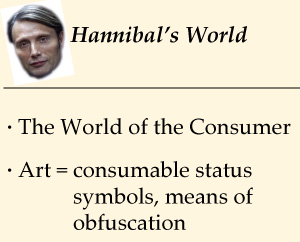
The Lecter/Crawford relationship gets to the heart of Hannibal’s critique of today’s commodity fetishism. It’s evident that Lecter consumes – having a European actor play him emphasizes the character’s Draculean ancestry – but he also represents the alienation that is often a consequence of unfettered consumption. We all know that Hannibal sees people as objects (see: “I’m having a friend for dinner,” et al.), but none more so than service providers. In Hannibal’s mind, the original sin is rudeness, which notably is the most mortal sin a customer service worker can commit. We’re in America, after all, the land of service with a smile. And so in America, Hannibal Lecter chooses his nightly meal by flipping through the business cards of the many service providers who have wronged him by not engaging in the affective labor he paid them for.
The best part is, we’re meant to chuckle at these scenes. Who hasn’t had a bad experience with a service provider? The exchange of goods and services is supposed to be smooth, uninterrupted by annoying human emotions! How dare they be rude when we’re trying to buy something! So when I watch these scenes, I sometimes smile and think, “You go, Dr. Lecter! You cook those guys up good.”
What? I’m no saint.
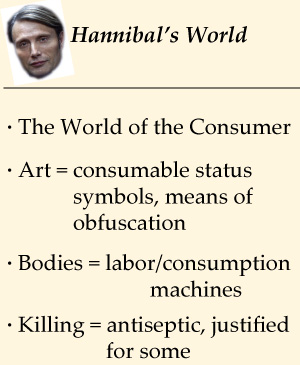
By continually placing Jack on the opposite site of Lecter’s table, Bryan Fuller and the rest of the Hannibal team compel us to play compare and contrast – and add Jack to the chart we’re making. Although more expressive than Hannibal, Jack too represents the alienated capitalist. Jack also treats people as commodities – most strikingly, special agent Will Graham, whom we’ll get to in a minute. The main difference between Lecter and Crawford is that Lecter is an individual working toward his own self-interest, while Crawford is an agent of the state. Both kill to preserve the “lifestyle to which they have grown accustomed” (to steal the words of Lecter’s therapist Gillian Anderson Bedelia DuMaurier), but the FBI’s killings are state-sanctioned, while Hannibal’s are only sanctioned by us, the rudeness-hating audience.
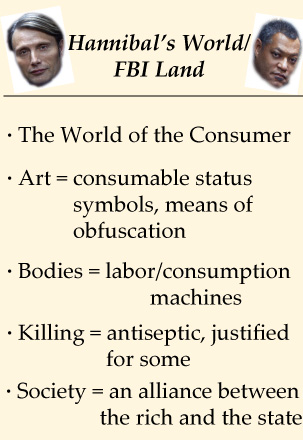
Put a country’s elite consumers in an alliance with the state and you can slide into a frightening situation, partly because these two groups have the power to create consensus reality. In the hyper-capitalistic world of Hannibal, stylish consumer Lecter presents himself as the most rational of rational actors – this is the Marxian charaktermaske he wears, so well-crafted that it keeps him hidden even from himself. He also uses his substantial interior decorating and gardening skills to create other dimensions of reality to hide in, like the cavernous office/library that says, “This is what professionalism looks like,” and a perfectly-organized chef’s kitchen that says, “This is what sanity looks like.”
Likewise, Jack and the rest of the FBI imagine themselves – and, by extension, the state – to be rational beings. From their factory-like buildings, they attempt (and sometimes succeed) to use their knowledge of biology, chemistry, and by-the-book psychological analysis to reinforce law and order, CSI-style. The FBI authorities define themselves as logical, functional cogs in an economic/political machine, a.k.a. their version of “reality.” Along with Hannibal, they pathologize those who don’t fit into this mold.
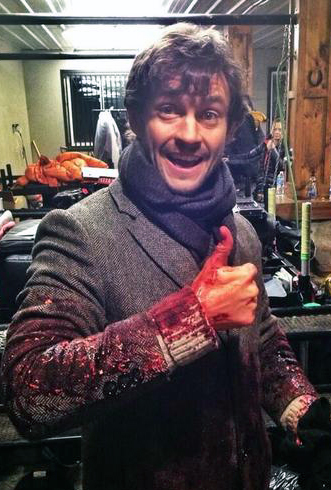
oh hey will
Enter Will Graham. What’s the opposite of homo consumericus? Whatever it is, that’s Will. Will’s modest home in the middle of nowhere contains a mattress, a fishing lure, a boat motor, a pile of unleashed dogs, and not much else. Will is decidedly not a fan of, or provider of, service with a smile. He can barely provide service with a bit of eye contact.
Even so, Will’s not estranged from humanity in the same way Hannibal and Jack are. While Hannibal and Jack cut themselves off from others by treating them as commodities to be manipulated, Will cannot do such a thing. He can’t help but empathize with others, especially those experiencing the most extreme and disturbing emotions, which is why he constantly seems about five seconds away from a nervous breakdown. While Hannibal protects himself by wearing a mask, Will is a naked nerve – exactly the kind of person you don’t want working your assembly line, at the customer service desk, or, say, in the FBI.
No wonder Jack is constantly calling Will “broken” and sending him to psychiatrists. Jack wants Will to fit into his machine so they can get their jobs done as efficiently as possible. Broken cogs aren’t productive. With mild coercion and overt threats Jack exercises biopower, working to control Will’s mind and body so it is useful to him and the FBI. Hannibal does so, too, with help of unethical doctors and the power of gaslighting.
Don’t get me wrong: I’m not saying Will is perfectly healthy or that he doesn’t need medical help. He does, absolutely – #somebodyhelpWillGraham. The problem is that he’s being sent to the wrong shrinks for the wrong reasons. He’s being diagnosed by people who are operating under this capitalist delusion that productivity, emotional detachment, and good taste are signs of sanity, and thus Hannibal is a well-bred fellow who doesn’t kill and eat people.
The transcendence of private property is therefore the complete emancipation of all human senses… The eye has become a human eye, just as its object has become a social, human object.
—Karl Marx
“Broken” is hardly the right word for Will when he is the only one with the ability to see through Lecter’s facade and puncture his constructed reality. As the platonic Consumer, Hannibal is associated with the mouth, which he uses to consume and to feed others lies. Will, on the other hand, is the Observer; his symbol is the eye. Throughout the first season, Will is repeatedly asked, “See? See?” and he does see through the artifice, even if he doesn’t consciously know it. Will’s authentic, organic connections to others, along with his apparently irrational leaps of logic, allow him to see beyond Jack and Hannibal’s consensus reality to a more naturalistic reality, which reveals that humans are more complex, emotional, and animal than the rational actors they pretend to be.
Put another way, Hannibal is a force of objectification that turns people and nature into symbols of use-value, while Will sees through status symbols to the nature and humanity underneath.
Example: Hannibal owns a bronze statue of an stag, a commodified simulacrum of nature. Again, Hannibal’s M.O. is to tightly control nature – and himself, everyone around him, reality itself – by processing it into status symbols (usually elegant food or visual art). Will has seen Hannibal’s statue but never actually noticed it. But his subconscious has. Starting in the first episode, Will has visions of a living demon-stag, his subconscious’ attempt to peel back Hannibal’s lifeless signifier to reveal the animal emotions it hides. As an artistic symbol, Hannibal’s stag statue is pretty empty; it only signifies its own economic and social value. Will’s demon-stag, on the other hand, is a symbol with weight; it points to reality. So Will’s psychological “brokenness” and surreal visions of nature direct him toward a truth nobody else can see: Hannibal’s bling is a cover concealing a message written in blood and dirt. That message says, “Hannibal Lecter is a monster.”
[Mankind’s] self-alienation has reached such a degree that it can experience its own destruction as an aesthetic pleasure of the first order.
—Walter Benjamin
Will’s not the only irrational actor out there, of course. Hannibal takes place in a world where every other person is a psychopath and every third person is an artsy serial killer. The show’s big irony is that, although these serial killers are called anti-social, their aims are bizarrely pro-social. Pretty much every non-Hannibal killer in the show murders in a strange attempt to find true connection in an alienated, hyperreal world.
Take Garrett Jacob Hobbs. The killer in the first episode, Hobbs acts as a mirror to Hannibal, for, surprise surprise, Hobbs is a cannibal, too. But their cannibalisms stem from two very different impulses. Hobbs eats young women to honor them and feel close to his teenage daughter. Hannibal kills the laborers he sees as non-human to create a more refined world for himself and other elites. It’s the difference between a hunter who communes with nature and uses every part of every animal he kills, and the rich guy who kills deer so he can have a sweet piece of art above his fireplace, something to prove his superiority to both the viewer and the deer.
Which is not to say Hannibal loves art while the other serial killers shun it. It’s just that their conception of art differs from Dr. Lecter’s. For the most part, Lecter’s art is the art of obfuscation: his beautifully-plated pork loin is actually the product of murder; his black and white ear photographs draw us from the real ears he has in his pantry.
The other killers, on the other hand, make works of art to create an authentic connection with others. I’ll list some of their artworks so you can see what I mean, but if you don’t want to be spoiled, skip to the next paragraph. Consider the shop owner who turns a human body into a cello to serenade a man he admires. The pharmacist who creates a human mushroom garden hoping their roots will connect them. The young woman who cuts through human faces hoping to find a friend beneath what she sees as masks. The old man creates a human totem pole as a legacy – and so he can socialize at his victims’ funerals.
These killers’ macabre artworks aren’t meant to conceal but reveal. They are more than mere performances; they’re expressions. Their value isn’t a market value but an emotional one. Where Jack sees bodies as cogs or machines (tools of production), and Hannibal mostly sees bodies as status symbols or objects to be consumed, the other serial killers in the show see bodies as bodies, connected to each other by humanity, decay, and death.
These works of “art” are horrifying, obviously, and the show is hardly celebrating serial killers like Hobbs. Rather, it’s saying that, in comparison with Hannibal and the FBI, the serial killers are more more in touch with their humanity, more honest. I think of this quotation by Marxist philosopher Slavoj Zizek: “Precisely because the universe in which we live is somehow a universe of dead conventions and artificiality, the only authentic real experience must be some extremely violent, shattering experience. And this we experience as a sense that now we are back in real life.”
So, in an odd way, the killers’ gruesome works of art wake us up – emotionally, spiritually, aesthetically, morally. At least, they do so for one man. Although 99% of the time Hannibal presents art as a status symbol and a means of obfuscation, occasionally the other killers’ creativity inspires Hannibal to express himself in seemingly more authentic ways. For example:
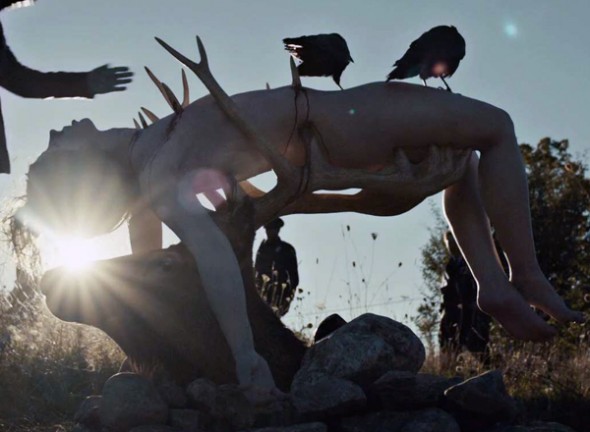
“Nude With Antlers, Sans Lungs”
This piece from episode 1, an homage to the work of Garrett Jacob Hobbs, is the first in Hannibal’s “Love Me, Will” series. This is the first time that Hannibal takes a break from throwing up masks so he can say without words, “Look, Will! I’m the Chesapeake Ripper! Can’t you see the real meeee???” Hannibal has made similar artworks out of bodies before, but that was theatrics, a way of boosting his own ego, humiliating his victims, and thumbing his nose at the police. But here, Hannibal’s putting himself at great risk of being caught, apparently in the hopes that he can have a real connection with Will. Arguably, his wish is that Will can break through his world of lies and alienation so he can scoot over to the other side of the board:
Could it be that Hannibal’s tired of being a consumer and objectifier and is ready to admit he and others are human? Or are Hannibal’s newest “artworks” simply another method of obfuscation, a way to play mind-games with his boy-toy Will? How long can Hannibal keep eating grumpy members of the proletariat, anyway? And can somebody, anybody, help Will Graham?
Find out this season on Hannibal, and sound off in the comments. (Just don’t forget to label spoilers if you’ve got ’em.)
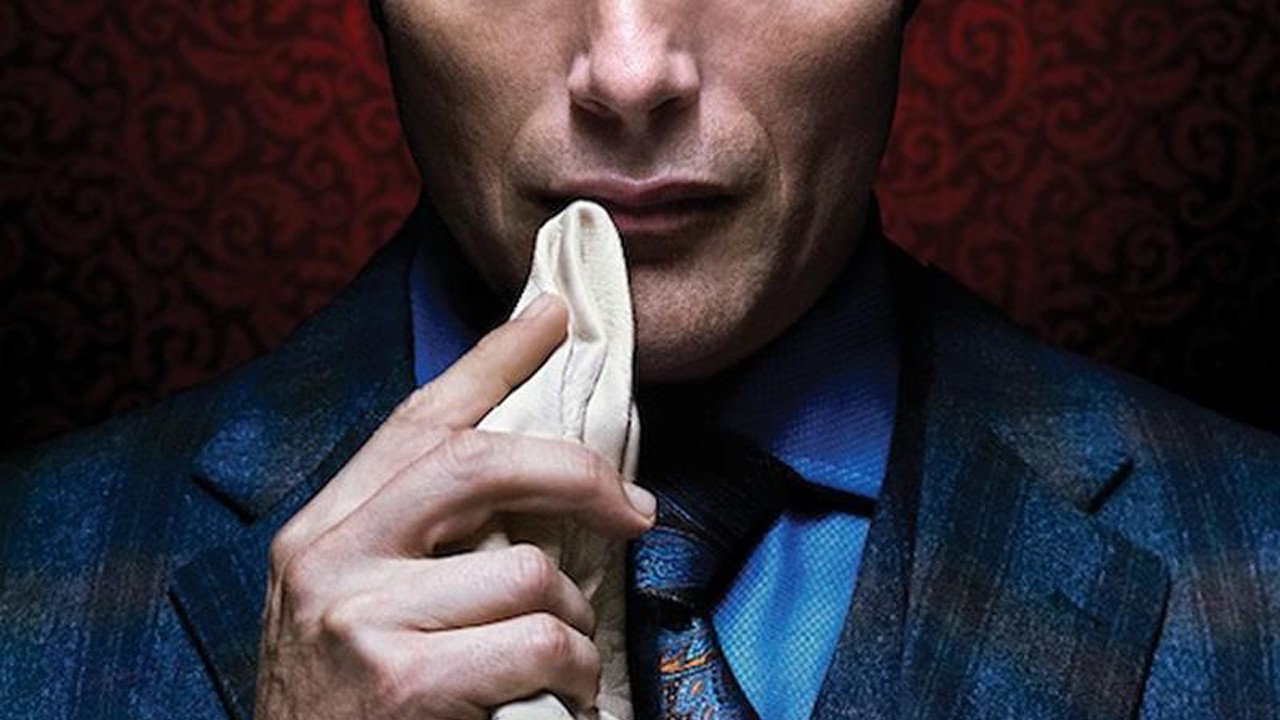
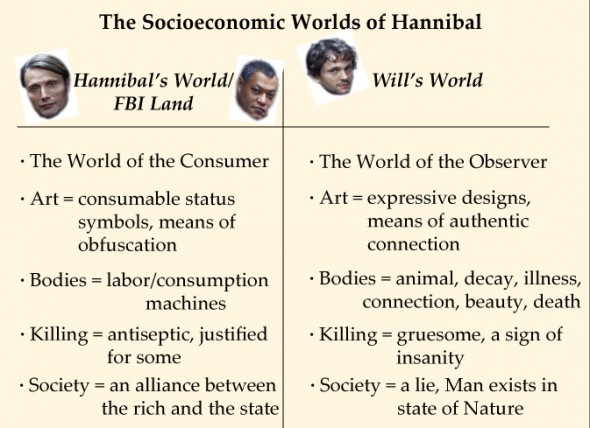
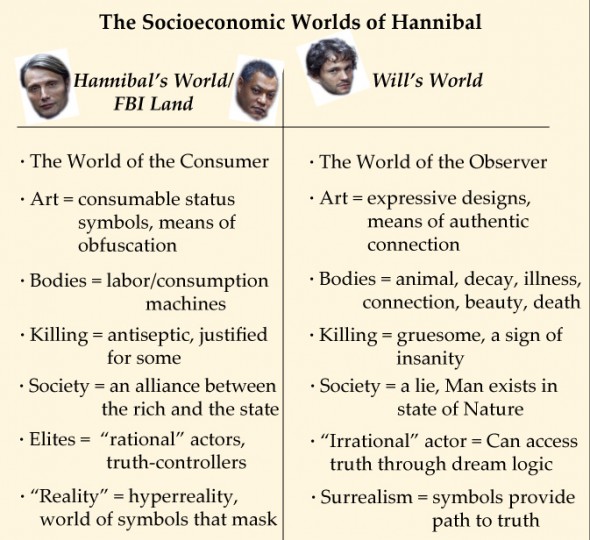
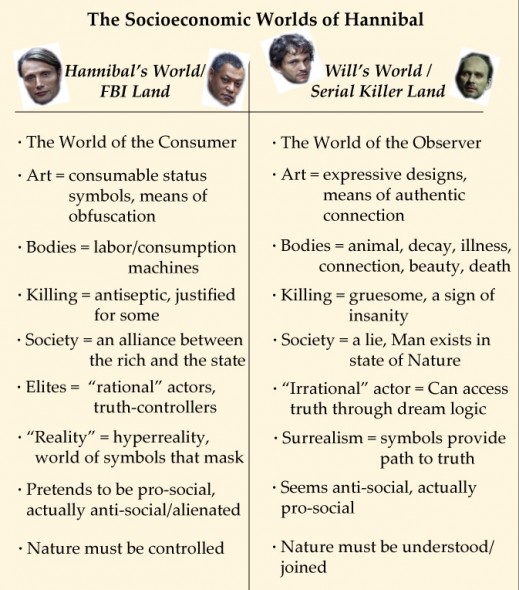
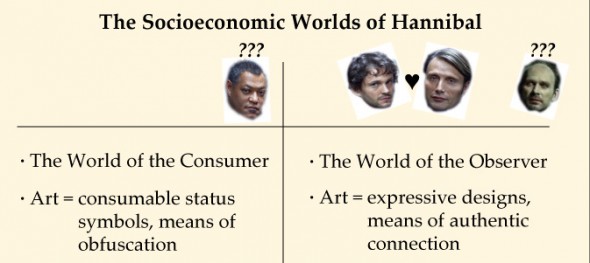
Thank you Shana! Great article. Having been a rabid fan while the first season was airing, I was thinking of starting a topic in the forums for Hannibal and it’s second season, so this is great. I hope you have some time in the busy lineup of recaps for Hannibal’s second season, it really deserves it!
I’m interested to see what type of economic ‘actors’ Alana Bloom and Bedelia DuMaurier will be in season two.
The Wearitrude tumblr is a treasure trove, I was particularly drawn to this: http://weartherude.tumblr.com/post/55431443711/japanese-woodblock-triptych-by-utagawa-kunisada-as
A woodblock triptych of a piece of Kabuki theatre. I love the idea of Hannibal as a piece of Kabuki.
Oh, mezdef, how I would love to recap all the season 2 Hannibal episodes. I was already thinking of writing a second article about how the show handles mental illness, but I wonder if anyone would read this stuff. We fans may be rabid, but we are few. If there’s enough interest, I’d consider it.
Please do! I’d love to read that article.
Oh yes please!!!
Please write it! This article was great, very funny and very astute.
I would read your article about mental illness in Hannibal two or three times at least.
Please, please, PLEASE continue overthinking Hannibal!!
Interesting article. Can’t say I hope for the same conclusion though. If anything I want to see Hannibal reject that notion of humanity and aspire to be something greater, something better than human. That does not exclude predating on the rest of us.
I crave truly alternative stories to all we consider conventional, and I tired of this message that to seek human connection is something that ought to be seen as redeemable (or at least a weird kind of positive) in the other serial killers when compared to Hannibal and the FBI.
Far from it, I want to see a show take the bold stance that seeking connection is inherently negative and should be avoided. I want a story that reinforces the belief that we are all inherently alone, wandering points of consciousness in a dark universe, and that this is a truth that should be embraced and celebrated rather than despaired upon. Solitude and isolation ought be the natural states of humanity, leading lives of self-satisfied contemplation. The tiger is more admirable than the ape in this respect, as are all solitary creatures of strength.
So all hail Hannibal, the human tiger. May he never learn to be an ape. Too many shows, even the much-vaunted Breaking Bad, dance around this topic only to eventually back away from it at the behest of society’s expectation. Maybe, just maybe Hannibal will be the first to leap defiantly into the darkness and remain there.
I expect we’ll see a pretty dark ending. This is Hannibal, after all. What I was getting at above, and maybe I didn’t express this point well enough, is that the show doesn’t seem to be too positive about either isolation or connection. At the moment, I think the show is leaning toward Will’s way of life as being slightly better, or at least more honest, than Hannibal’s and especially Jack’s, but of course Will’s attempts at connection led him to lose his sense of self and into the arms of a manipulative cannibal. Likewise, the serial killers’ attempts at connection ended in, you know, serial killing.
**SPOILERS**
One could argue that the most effective attempt at connection in season 1 was the creation of what the Internet calls the “murder family” (Hannibal/Will/Abigail), which acted as a kind of dark mirror to other TV shows’ sappy “We’re not related by blood, but we’re family now!” tendencies. And we all know how the murder family’s story ended. Not well. Not well at all.
That said, one could also argue that Will wouldn’t have felt the need to join such an unhealthy family unit if he weren’t living in such an alienating society. If efficiency and pseudo-professionalism weren’t so fetishized in the show’s world, Jack, Alana, and maybe even the CSI team would have been more available as friends, and latching onto Hannibal wouldn’t have seemed so necessary.
We definitely agree on one point: I would be disappointed if the show got as moralistic as Breaking Bad did in its later seasons. I love Breaking Bad, but Hannibal is no morality play.
Although it could certainly make for interesting television, a show taking that stance in a strong way is unlikely unless they are attempting to commit ratings suicide by viewer alienation. Making cinematic the enjoyment of solitude and contemplation is a hard ask, especially for a TV show. Dexter certainly could have explored this, but lets not sully Hannibal with that show and it’s many disappointments.
I might suggest the (so far) excellent _True Detective_ (currently running on HBO), but I’m unsure where it’s going to land on the solitary nature of both it’s leads.
As I expressed briefly above, I’m particularly interested to see an exploration of Alana Bloom and Bedelia DuMaurier, both of whom a relationship or sustained personal connection / interaction with our two leads will most likely produce some friction and examination of how they define themselves in relation to others. Hannibal is certainly a character who seems to enjoy and thrive on solitude, where he interacts ‘at’ others (much in the way you cab laugh at someone rather than with them), and Will is a walking talking hedgehog’s dilemma.
I think it’s impossible to send that message without undermining it at the same time, because the mere act of sending a message already betrays a desire for connection. People who don’t need to connect don’t need to communicate.
There’s plenty of art that’s all about how that longing for connection is vain and doomed and downright destructive and ultimately just leads to all sorts of misery, like some drug you’d be better of without. But there can never be any art that completely negates its appeal. Because people who truly don’t get the appeal of connection (doomed, and vain, and counter-productive as it may be) don’t have any reason to create art.
Just started watching the show on the strength of this article, and now I’m obsessed. Questions (for Mlawski, or the general commentariat):
• Traditionally, the ability to observe is associated with the capitalist/consumer/FBI side of things, is it not? (The panopticon, the Male Gaze, Big Brother is Watching You, all that.) How does this kind of observation square with Hannibal’s account?
• To what degree do you think Dr. Lecter is successful in his attempts to observe and know Will Graham?
Hooray, a new convert! Now go forth and spread the good word!
AND NOW, THE LONGEST COMMENT EVER
Your questions are very, very smart, Mr. Stokes, which is unsurprising as you are a smarty pants. I would very much like to hear your own answers after you’ve finished the first season. These are my thoughts:
Bullet point 1: What you said about the panopticon etc. made me realize I should have been more precise with my language. We’re dealing with different meanings of the word “see” here. When Will “sees,” we mean it metaphorically, mostly. He doesn’t just observe surfaces. He intuits; he is the Seer. You’re right that the state observes, too, but when we talk about the FBI “seeing,” we’re talking more literally. The forensics team literally looks at evidence every day; the FBI, like Big Brother, surveils to keep control.
I think if Hannibal is saying anything about the panopticon-like nature of our society, it’s saying the panopticon doesn’t work if its goal is to create law and order. It can only encourage people to adopt the appearance of compliance. When the state surveils, looking only at the surface of things, a cannibal in a well-tailored suit won’t register as non-compliant. A surveillance state is only as good as the images being fed into its security cameras, and Hannibal’s “I’m so posh” act shows how easily those images can be doctored.
So the FBI observes, but their observations are a kind of consumption. They’re consuming the glossy, Photoshopped images Hannibal wants them to consume. Hannibal’s acting as his own advertiser, and Jack is so impressed with the branding that can’t wait to buy what Lecter’s selling. And so the people who think they’re running the panopticon aren’t really the ones in control. They think they see, but they’re just being razzle-dazzled.
Freddie Lounds is another kind of advertiser/propagandist, but her job is to make certain others look bad. Though Jack is constantly ranting about her photos and yellow journalism, he still consumes those images and articles, and they do affect his behavior and his perception of Will. I suspect surveillance will be a much bigger theme in the second season than it was in the first, so I guess we shall return to this question!
Bullet point 2: Hard to know. Obviously Hannibal has to be a good observer of people to be able to manipulate them so well, and in a strange way he makes a decent therapist, if you ignore all the grossly unethical behavior. But there are a couple of lines in the final two episodes of season 1 that make me think Hannibal’s attracted to people he has trouble understanding.
*AND NOW I WILL SPOIL THINGS FROM THE LAST TWO EPISODES*
I’m thinking of 1) when Hannibal tells Abigail that he called her dad in the first episode because he was curious about what she would do, and 2) when Will says Hannibal started manipulating him to see what he would do. Hannibal might be curious about Abigail and Will because he thinks watching/metaphorically consuming them might help him understand himself. He has an easier time knowing Abigail: he quickly pegs her as a survivor like himself, and all he needs to discover is how far she’ll go to survive and how much he can mold her.
Will’s a tougher nut to crack. Maybe Hannibal thinks, “Here’s this empathetic guy who is the exact opposite of me. I don’t get this guy at all… so let’s see if I can turn him into a serial killer, too! That way, he’ll understand me, and then maybe I can understand why I am the way I am.” He wants to make Will into his reflection so he can see himself from the outside. I guess it worked, because the last image of the season has Will in a cell and Hannibal outside, a mirror image of a famous scene from a certain movie. I think the final “Will.” “Doctor Lecter.” exchange is meant to show that, by the end of the season, they both finally see each other, and they see themselves for who they really are. The refrain, “I know who I am” is accurate for both of them in that scene.
Ugh, let’s just rename this place Overcannibalizing It already. I could write crap about this damn show all day.
That strikes me as just exactly correct. The panopticon sees widely, but shallowly. Will’s vision is narrow but deep. There’s something very big-R Romantic about the whole thing, isn’t there?
And maybe with Lecter, and with the government as well, there’s a certain amount of… how to put this: the force that they wield, by virtue of their position in society, allows them to make their shallow and non-penetrating vision of the world into the true one? I’m thinking about the thing in the first episode where Will says, of Hannibal’s copycat murder “Whoever did this saw this girl as a pig.” And I’m imagining a scene where the victim says, “Hey! I’m a person with hopes and dreams, and a really complex relationship with rum raisin ice cream, and I hiked ten percent of the Appalachian trail last summer! I’m taking Portuguese lessons at the learning annex, but only because I think people have to keep learning or they die inside day by day! I’m not a pig!” And then Hannibal says “Pardon me. But you are. [Sound of butcher knife being removed from its sheath.]”
You put it better (and much more succinctly) than I did. Romantic is exactly the right word. Is it weird that your comment made me hungry? Mmmmm, learning annex pig.
By the way, I would love it if you wrote an article about the show’s music and sound design. No pressure, obviously, but I seem to recall that horror film music’s your bag.
Wow, first TV review I’ve ever heard quote Walter Benjamin. Thank you for explaining to me why I enjoy this show so much! :D
God I love this so much because I keep jokingly tell people that Hannibal is an anti capitalist bourgeiose